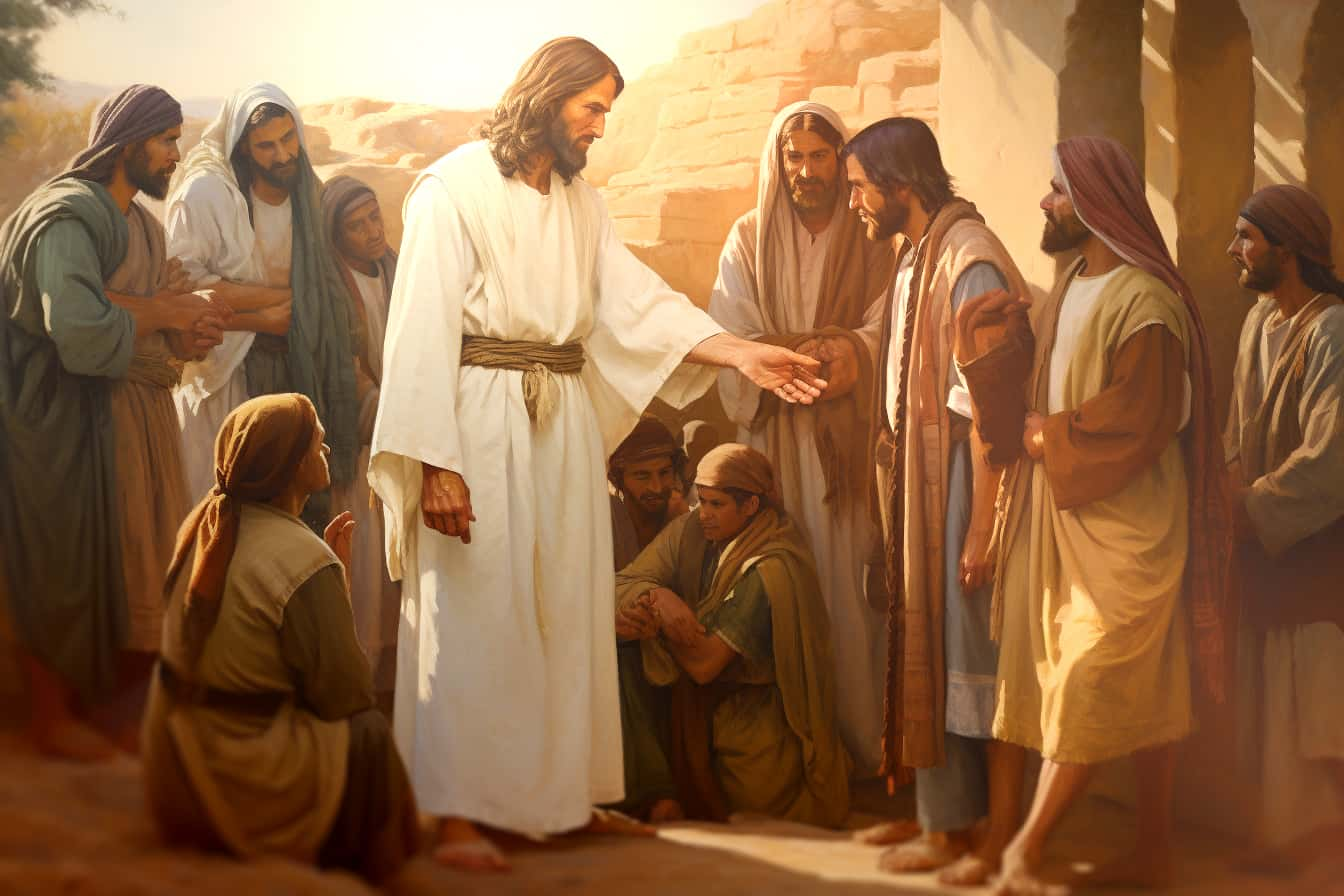Discover Jesus \ Events \Jesus Heals the Ten Lepers
Tag
Jesus Heals the Ten Lepers
When Jesus approached Amathus, he healed ten lepers, including a Samaritan who uniquely expressed gratitude. This incident underscored the broader acceptance of Jesus' teachings among non-Jews and challenged entrenched religious biases.

Table of Contents
Summary
In teaching about the kingdom of heaven, Jesus and his followers often received a warmer reception from non-Jews, including the Samaritans, who generally were disliked by the Jews. When Jesus and his group approached the city of Amathus, they encountered ten lepers, including a Samaritan who had been accepted by the Jewish lepers due to their shared condition.
After healing them, only the Samaritan returned to express gratitude directly to Jesus, illustrating the power of faith across cultural divides and challenging entrenched religious biases. This event highlighted the broader acceptance of Jesus' message among non-Jews and demonstrated the indifference of those who took their blessings for granted.
One Samaritan
When teaching about the kingdom of heaven, Jesus, his apostles, and the seventy disciples often found a greater reception among the non-Jews. Even the Samaritans, whom the Jews held in enmity and avoided, would readily accept the Gospel. At the same time, the Jews refused to give up the security of simply obeying the temple’s requirements. When Jesus approached the city of Amathus near the border of Samaria, a group of ten lepers awaited, having been notified by the seventy disciples that Jesus and his apostles were on their way. As Jesus drew near, they implored Jesus to heal them as he had others.
The group consisted of one Samaritan and nine Jews. Because they shared the same affliction, the Jews allowed the Samaritan to join them, overcoming their religious prejudice in this one special case. Jesus had just been commenting on how the gentiles of Perea and the Samaritans welcomed their message.
Simon Zelotes, the uncompromising Jewish patriot, spotted one Samaritan among the lepers and suggested they just keep walking. Jesus asked Simon, "But what if the Samaritan loves God as much as the Jews? Should we pass judgment on our fellow men? Who could tell? If we make these ten men whole, perhaps the Samaritans will be more grateful than the Jews. Simon, are you certain of your opinions? Simon responded quickly, "If you cleanse them, you will soon find out." Jesus replied: "So shall it be, Simon, and you will soon know the truth regarding the gratitude of men and the loving mercy of God."
A Challenge to Entrenched Teachings
When Jesus approached the lepers, he said, "If you want to be healed, go immediately and show yourselves to the priests as required by the law of Moses." And as they went, they became whole. But when the Samaritan saw that he was being healed, he turned back and, on his way to find Jesus, began to praise God loudly. When he found the Master, he fell to his knees at his feet and expressed gratitude for his cleansing. The nine others, the Jews, had also discovered their healing, and while they were grateful for their cleansing, they continued on their way to meet with the priests.
As the Samaritan remained kneeling at Jesus' feet, the Master looked around at the twelve, particularly Simon Zelotes, and asked, "Were not ten cleansed? Where are the other nine, the Jews? Only one, this alien, has returned to glorify God. Then he told the Samaritan, "Arise and go your way; your faith has made you whole."
As the stranger departed, Jesus looked back at his apostles. The apostles all looked at Jesus, except Simon Zelotes, who had downcast eyes. The twelve did not say a word. Jesus did not speak because it was unnecessary.
Though all ten of these men believed they had leprosy, only four were afflicted. The remaining six were cured of a skin disease that had been mistaken for leprosy. But the Samaritan actually had leprosy.
Jesus instructed the twelve not to speak about the cleansing of the lepers. As they entered Amathus, he remarked, "You see how the children of the house, even when they are insubordinate to their Father's will, take their blessings for granted." They think it's insignificant if they don't give thanks when the Father heals them, but strangers are filled with awe when they receive gifts from the head of the house and are forced to give thanks in recognition of the good things bestowed on them." Upon hearing, the apostles remained silent.
Suggested Reading from this Essay

Related People
Simon Zelotes
Apostle and zealot; often spoke without thinking.
Jesus
Son of God, Son of Man. Creator Son of the Universe.
The Twelve Apostles
The chosen followers of Jesus.
Related Topics
Jesus' Miracles
An overview of 25 extraordinary events from 26-30 CE.
Contributors
Gregg Tomusko, Mike Robinson, Gary Tonge
